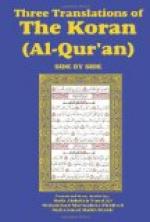This, for that God is the truth; and that whatever ye call upon beside Him is a vain thing; and that God-He is the High, the Great.
Seest thou not how the ships speed on in the sea, through the favour of God, that he may shew you of his signs? for herein are signs to all patient, grateful ones.
When the waves cover them like dark shadows they call upon God as with sincere religion; but when He safely landeth them, some of them there are who halt between two opinions.11 Yet none reject our signs but all deceitful, ungrateful ones.
O men! fear ye your Lord, and dread the day whereon father shall not atone for son, neither shall a son in the least atone for his father.
Aye! the promise of God is a truth. Let not this present life then deceive you; neither let the deceiver deceive you concerning God.
Aye! God!-with Him is the knowledge of the Hour: and He sendeth down the rain-and He knoweth what is in the wombs-but no soul knoweth what it shall have gotten on the morrow: neither knoweth any soul in what land it shall die. But God is knowing, informed of all.
_______________________
1 Nothing certain is known concerning the history of this fabulist and philosopher. The opinion most generally received is that Lokman is the same person whom the Greeks, not knowing his real name, have called Æsop, i.e., Æthiops. This Sura shews the high degree of respect entertained for Lokman in Arabia at the time of Muhammad, who doubtless aimed to promote the interests of his new religion by connecting the Koran with so celebrated a name.
2 See Sura lxviii. 1, p. 32.
3 Beidh. and Itq. suppose this verse to have been revealed at Medina, on account of the precept to pay the impost, required by Muhammad of his followers as a religious duty, and different from the alms. The former is usually coupled with the duty of observing prayer. Mar. renders, sacrum censum in marg.
4 Nodhar Ibn El Hareth, who had purchased in Persia the romance of Roustem and Isfendiar, two of the most famous heroes of that land, which he recited to the Koreisch as superior to the Koran.
5 Comp. Ps. civ. 5.
6 This verse and the verse following would seem more naturally to follow verse 18, where Wahl has placed them. See preceding Sura, v. 7.
7 Comp. Talm. Kethuboth, 60, 1, “A woman is to suckle her child two years.” Comp. Jos. Ant. ii. 9, 6.
8 Or, the seen and unseen, lit., outwardly and inwardly.
9 Or as rendered in verse 11, “the self-sufficient.”
10 Wah. Omar ben Muhammad, Zam. and Beidh. suppose this and the three following verses to have been revealed at Medina, in answer to the Jews, who had affirmed that all knowledge was contained in their own Law. But the accuracy of this supposition is very doubtful, if considered with regard to the preceding and following context.




